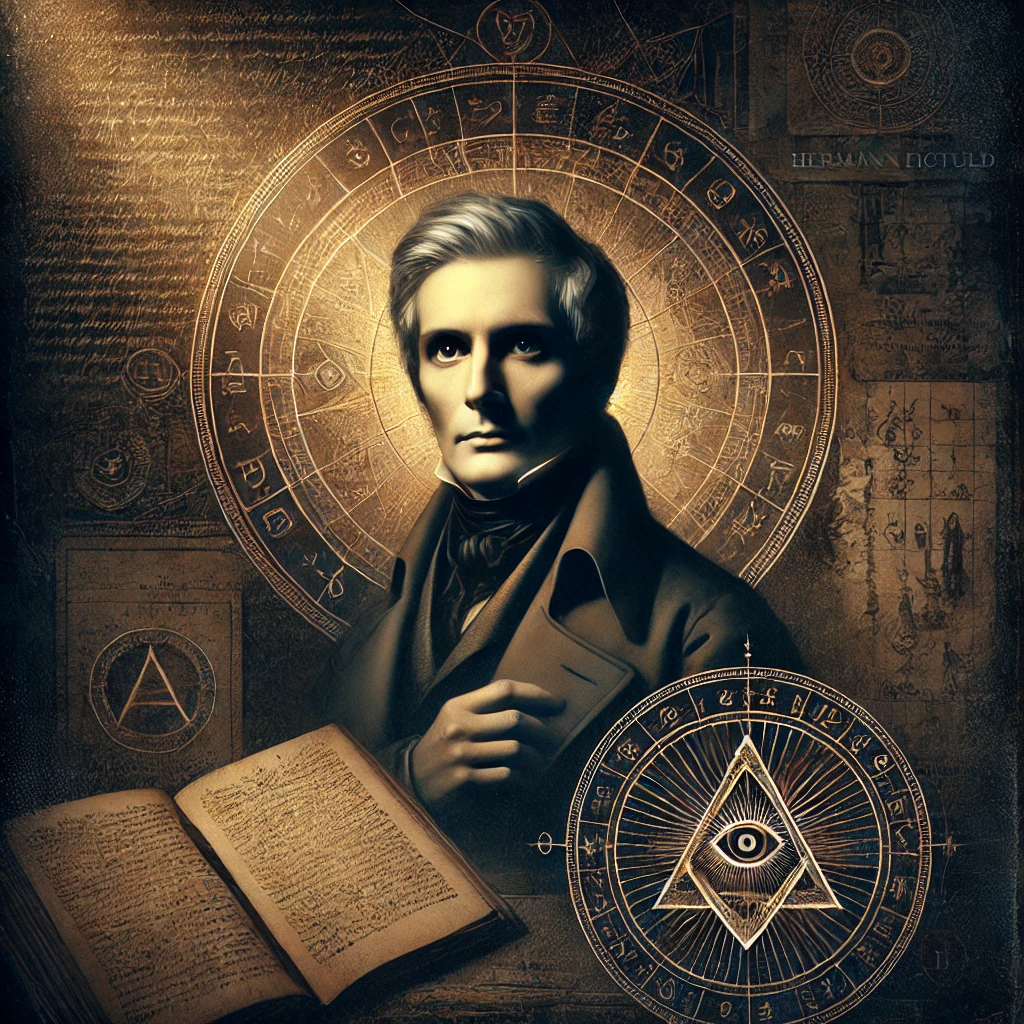Alchemist, Mystic, and Phantom of Esoteric Order
Hermann Fictuld, a name whispered through the crumbling corridors of esoteric history, a man who may have existed or may have been a cipher, a sigil scrawled upon the yellowing parchment of the damned. Born, if birth is something we can attribute to such a being, in the early 18th century, he emerges like an alchemical wraith from the fumes of secrecy, stepping onto the grand stage of mysticism to formalize the Order of the Golden and Rosy Cross. His life is a puzzle, a series of disconnected ciphers, an ouroboros consuming itself in historical obscurity. Was he flesh and blood, or merely a projection of the order’s collective delusion, a fever dream conjured by minds teetering on the precipice of revelation and oblivion?

A Shadow Among Scholars
The 18th century was a breeding ground for secret orders, societies lurking beneath the Enlightenment’s smug rationalism, whispering of transformation, transcendence, and gold conjured from base metals. In this feverish climate, Fictuld moved like a phantom, assembling the shattered remnants of Samuel Richter’s 1710 work, “Die warhafftige und volle Bereitung des philosophischen Steins der Brüderschaft aus dem Orden der Gold- und Rosen-Creutzes.” Richter himself is a ghostly figure, and Fictuld, in his purported organizational brilliance, either revived or usurped his legacy. Who was he serving, a hidden master, the Order, the capricious and unknowable will of the Great Work, or something else, something writhing behind the veil of perception?
The Order of the Golden and Rosy Cross
Imagine a fraternity bound by rituals, oaths, and a thirst for the ineffable, an insatiable hunger to rip apart the mundane and reconstruct reality itself. The Order of the Golden and Rosy Cross was structured like a stairway to God or madness, nine degrees of initiation pulling the adept further into alchemical ecstasy or spiritual oblivion, or both at once. Fictuld’s contributions seem to be in its statutes, its rigid structure, a blueprint for ascension, yet nowhere do we find a definitive book of his own hand. No great tome, no magnum opus, just the order itself, a living book, a sentient labyrinth of secrets. Was Fictuld an author or a scribe, a true adept or merely a man swept up in the tidal forces of ancient knowledge too vast for his mortal mind? Did he write in ink, or did he write in the minds of those who followed him, his words a virus that infected initiates with an incurable hunger for the impossible?

Alchemical Madness
The 18th century danced upon the knife’s edge of reason and insanity, and Fictuld’s work embodies this duality. Alchemy, was it merely symbolic, a map of spiritual ascent, or did he truly believe in the transmutation of lead into gold, not just metaphorical but tangible, a process that might shatter the chains of material existence? Gold, that unholy lure, that seduction of both kings and lunatics, the gleaming bait on the hook of forbidden knowledge. Did Fictuld labor in the flickering candlelight, hunched over alembics and crucibles, his mind unraveling as he sought the philosopher’s stone? Did he find it, did he vanish because he succeeded, or did he perish, consumed by his own failed transmutation? Or worse, did he transform into something else, something beyond comprehension, something that lingers still in the periphery of those who dare seek him out?
The Disintegration of Identity
Fictuld is an enigma wrapped in a conspiracy, a reflection in a dark mirror that shifts when observed too closely. Some claim he was the architect of the order, others that he was a mere functionary, a name assigned to a collective effort, a pseudonym hiding an entire network of mystics. The rational mind demands answers, but Fictuld offers only labyrinths. He is both founder and reformer, alchemist and ghost, master and servant. We search for him and find only symbols, sigils, cryptic writings, as if he were a tulpa conjured by the Order’s will, an idea given flesh, then dissipated when his work was complete, when his presence was no longer required. Or perhaps he lingers still, whispering through the corridors of time, a phantom encoded in ink and fire, waiting for the right mind to reconstruct him from the fragments.
Legacy of a Vanishing Man
Did Fictuld exist? This question is absurd, yet essential. If he did, he was an architect of esoteric thought, a weaver of ritual and transformation. If he did not, then his name is the ultimate deception, the perfect Rosicrucian trick, an alchemical thought-form transmuting fiction into history. His Order influenced later societies, the Societas Rosicruciana in Anglia, the Hermetic Order of the Golden Dawn, ripples spreading across centuries, echoes of a ghost’s whisper, a puzzle that perpetuates itself through the ages.
Hermann Fictuld. A name. A myth. A cipher. We search for him in the ashes of the past, in forgotten manuscripts, in the margins of forbidden books, but he recedes ever further, laughing from the void, forever just beyond our reach. Perhaps that is his final transmutation, the ultimate secret of the alchemists, not the transformation of base metals into gold but the transfiguration of identity into legend, an eternal existence in the form of speculation, a presence that outlasts the limits of flesh.
Maybe Fictuld did not disappear, perhaps he only changed form. Perhaps he is still here, lurking in the shadows of libraries, hiding in the spaces between words, speaking through those who dream too deeply of alchemy, waiting for the next initiate to stumble upon his path and follow him into the abyss.
